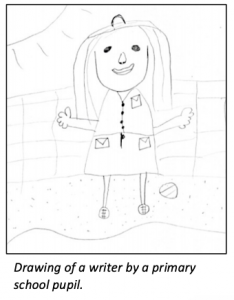Developing creative writing in schools
Today marks the publication of findings from our three-year long evaluation of Arts Council England’s ‘Creative Writing in Schools’ (CWiS) programme.
What did we evaluate?
In 2015, Arts Council England committed £1.2m to fund CWiS, which:
- Was a three-year long programme delivered by First Story and Paper Nations;
- Involved 3,000 pupils aged 8- to 14-years-old (around a third of whom were eligible for the pupil premium), alongside their teachers, and amateur and professional writers, and;
- Targeted areas of the North East and South West with high levels of socioeconomic deprivation and low arts engagement.
LKMco used its literature review outlining schools’ engagement with creative writing to inform the evaluation’s design, and we used a wide range of approaches to help participants engage with the research. 
For example, alongside more traditional evaluation tools including longitudinal surveys and interviews, we asked primary school children to draw what they imagine writers to be like (see right), before then encouraging them to talk about their drawings.
What did we discover?
The evaluation highlights a wide range of benefits that creative writing can have for children and young people, and their teachers, although we also heard about barriers that can limit schools’ engagement with creative writing.
Importantly, young people and teachers value writing for the pleasure it gives, rather than for its benefits in improving technical accuracy.
Networks – such as those supported by Paper Nations and First Story throughout this evaluation – played a vital role in bringing writers and schools together, and helping writers share knowledge, resources and opportunities.
We found the CWiS programme helped pupils feel more confident as writers, which also increased their confidence in wider school life.
While the programme provided coordination and networks that helped secure and sustain partners’ engagement, time and financial pressures facing schools and writers are significant, and largely persisted in the face of CWiS activities.
What should happen next?
Our evaluation shows that structured support from a professional writer can help build young people’s confidence, enabling them to overcome their initial fears of writing, develop positive relationships with adults and peers, and express themselves more authentically on the page and with their peers.
We found writers enjoy working with young people because they want to pass on their love for writing and value developing their teaching skills, but securing fair pay presents a substantial challenge (while also striving for widespread access to creative writing opportunities for pupils). Greater knowledge and coordination about pay is needed to make creative writing in schools viable in the long run.
We suggest that future work should prioritise involving groups of young people and teachers who are not initially curious about or inclined to get involved in creative writing.
First Story and Paper Nation will be sharing resources to encourage more schools and writer development organisations to support children and young people to write creatively.
A summary version of the evaluation is also available.


Comments